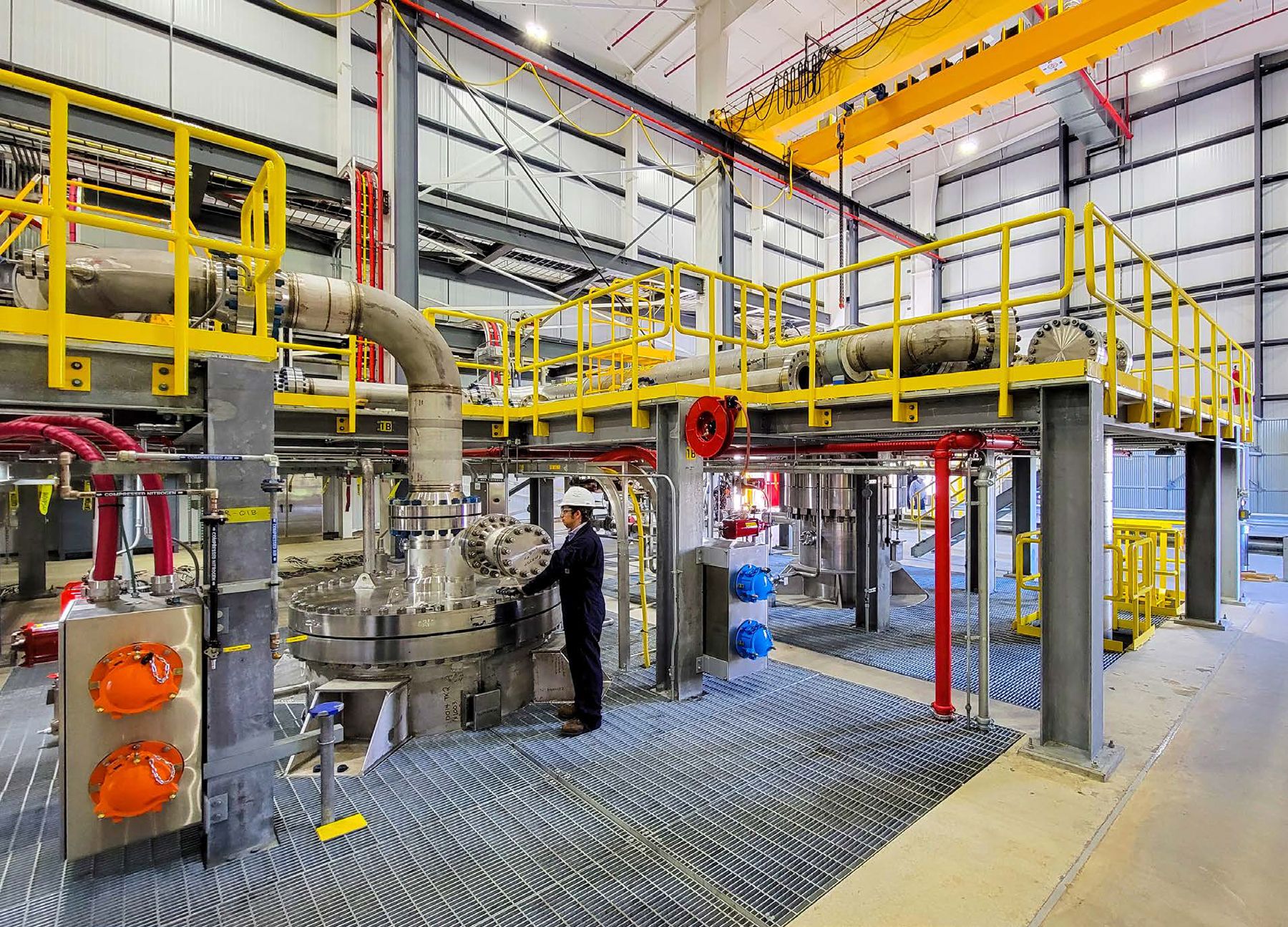Turbo Tour: Elliott Group’s Cryogenic Pump Test Facility
Turbomachinery International attended the ribbon-cutting ceremony of the Elliott Group’s new $60 million cryogenic pump test facility.
Test engineer on Elliott's new cryogenic testing facility test floor. Image courtesy of Elliott Group.

Turbomachinery International visited Jeanette, Penn. to witness the opening of Elliott Group’s new $60 million cryogenic pump test facility. Construction on the Cryodynamic Products testing facility kicked off in December 2019. The ribbon-cutting ceremony took place in late October 2021. It included industry representatives as well as county, local, and company officials.
The speakers were: Toichi Maeda, Chairman and Director, Ebara Corp., parent company of Elliott; Curtis Antoniak, Mayor of Jeanette, PA; and Mike Lordi, CEO of Elliott Group, who ended the formalities with a toast.
A tour followed:
The new complex includes six buildings, with about 30,000 sq. feet under roof on the 13-acre campus. It will generate approximately 100 jobs. The test loop features two cryogenic pump test stands and a dedicated cryogenic expander test stand. As it is indoor and enclosed, weather conditions have no impact on testing.
"We can test a full range of cryogenic pumps and liquid expanders, from the smallest units to units larger than those currently available in the industries we serve,” said Mark Babyak, Vice President of Cryodynamic Products and Industrial Products at Elliott. “We can test units with liquid nitrogen, natural gas, or propane, depending on their specific application, and we’re equipped with the latest instrumentation technology."
The facility has its own dedicated 25 kV electric utility service, a 25-ton crane with a 10-ton independent auxiliary hook, an energy-efficient cooling system, vacuum-jacketed insulated piping, redundant in-line heat exchangers, vessel-mounted tube bundle heat exchangers, and insulated vessels. In addition, its liquid storage tank farm houses a 60,000-gallon liquid nitrogen (LN2) tank, a 60,000-gallon liquefied natural gas (LNG) tank, and a 36,000-gallon liquefied petroleum gas (LPG) tank.
There are two cryogenic pump test stands. Test train 1 has three vessels (two pumps and one dedicated to expander testing) with a maximum pressure of 2,160 psig and a maximum flow of 4,000 M3H. It has a 5 MW medium-voltage drive (range of 2,300 to 6,900 volts) and a 1 MW low-voltage drive (380 to 690 volts).
Test train 2 has two pump vessels with a maximum pressure 3,600 psig and a maximum flow of 1,300 M3H, as well as medium- and low-voltage drives with the same specs as test train 1.
The dedicated cryogenic liquid expander test stand has an easily configurable test loop, standardized loop designs for upward or downward flow, and can test pumps while setting up the expander test loop. Its modular piping design can deal with inlet pressures up to 2000 psig.
Babyak said a few pumps had been tested as trial runs and that the facility would shortly go into full production. On the agenda are major tests for pumps and expanders destined for LNG projects around the world.
“We can test both column-mounted and vessel-mounted units,” said Babyak.
The company’s previous testing facility was not completely enclosed so weather such as strong winds often delayed tests. Further, only one test loop was available. Now with two test loops, Elliott can carry out lengthy setup procedures for one test while another test is ongoing. That means far more tests can be done, the size of the unit that can be tested has doubled, testing times are decreased, and delivery schedules can be brought forward. The electrical load limitations of the older facility have also been eliminated.
“The size of liquefaction plants and expanders continues to grow,” said Babyak. “Hardly anyone else on the planet can conduct such tests, and our facility is much larger and more modern than any other.”
